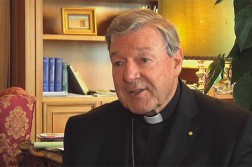“What can you say about a 25-year-old girl who died? That she was beautiful and brilliant? That she loved Mozart and Bach, the Beatles, and me?”
So went the classic and poignant lines from the movie Love Story — but could they not also be used to lament the passing of Baroness Margaret Thatcher? Sure, she wasn’t a 25-five-year-old girl, but she was certainly beautiful and brilliant, from certain angles. And most likely she loved Mozart and Bach and the Beatles; who doesn’t?
But most importantly, she loved “me”. And it doesn’t matter whether by me I mean me, or you, or Ryan O’Neal, because Margaret Thatcher loved all of us equally. Like her role model, Jesus, her love was boundless and without condition. No politician in living memory has ever committed herself so selflessly to doing what is best for the people of the world, even if they don’t realise it at the time, and even if in the short term it left them unemployed or starving or uneducated or dead. Thatcher was a giver, and that’s all too rare in today’s greedy, take-take-take, benefits-rorting world.
Most people today probably only know Thatcher as the kindly baroness and retired public speaker, but it may come as a surprise to many of you that she was at one time prime minister of Britain. Yes, a female prime minister! And this was before the New World Order and the moral capture of the global political establishment by Emily’s List and the CWA, so back then becoming prime minister was quite an achievement. And by looking at Thatcher’s time as PM, we can learn some invaluable lessons for our own time, our own lives, and our own relationships with what modern-day radical feminists like to call “women”.
First of all, there is no doubt that Thatcher was a feminist icon. For one thing, she publicly said that she loathed feminism, and what could be more feminist than that? For feminism, as both Jessica Rowe and Carrie Bickmore agree, is about choice, and denouncing feminism is a choice that Thatcher made which proves her feminist credentials beyond doubt. Nobody could double-bluff the patriarchy like Maggie. And because of her, a generation of starry-eyed little girls could genuinely believe that if they believed in themselves and worked hard, they too could grow up to be cold-eyed neo-fascists.
But of course, Thatcher was about more than just fighting for the rights of women everywhere. She transformed Britain, and the world, through her heartfelt belief in free markets, private enterprise, and kicking unionists right in the tenders. She inspired millions when she stood up to the tyranny of labour, believing that the freedom of the human spirit was more important than the slavery of employment. And just as she freed those miners from the exhaustion of having to work in mines, so she freed so many of Britain’s industries from the gulag of state ownership. “Electricity retailers are people too,” was her motto.
And that goes to the heart of what Margaret Thatcher was all about – equality. She herself was the humble daughter of a shopkeeper, who had risen to her position of eminence through sheer hard work, gumption, and a vaguely homicidal way of looking at people. She had no time for those who would seek to divide us: she was a uniter, and no matter your background or personal circumstances, she would treat you the same.
To her, the humble street-sweeper and the lofty hereditary peer both had an equal right to make millions of pounds as the heads of massive corporations. The children of unemployed single mothers and Conservative Party elders alike had the right to have public education funding slashed. She believed that all the peoples of the world deserved to benefit from reduced Asian immigration. And to Thatcher, it didn’t matter whether you were an Argentinian sailor, an Irish dissident, or a Cambodian communist: she wanted you equally dead.
Of course, not everybody agreed with her: you can’t be a major reformer and public benefactor without making a few enemies/potential assassins along the way. But whether you were attuned to her political stance or not, you had to admire the strength of her convictions. Like other great surfers of the tide of history such as Gandhi, Mark Latham and Phil Spector, she had her principles, and she pursued them with utter determination, and that’s an attitude we can all respect, surely. As the old saying goes, it’s not how many lives you ruin, it’s how much fun you had doing it.
Yes, Margaret Thatcher left a great legacy for us all, but perhaps nobody can learn more from her memory than our own Julia Gillard, and not just about how to stop being such a mouthy Marxist femmo. She can learn dignity. She can learn grace under pressure. She can learn how to stick to her guns even in the face of poor polls, a hostile media, and vague stirrings of human decency. And most of all, she can learn how to boost poll numbers through a well-timed declaration of war. The last one I hope Gillard heeds in particular – I’m sure we can avoid an Abbott prime ministership if we launch just a moderate invasion of Vanuatu. Gillard has so much in common with Thatcher – hair colour, reproductive organs – it really would be apt if she adopted her stylish disregard for human life.
So Vale, Margaret Thatcher. We will remember you as blazing star traversing the gloomy firmament of everyday political badinage. Everyone on this planet owes you a debt of gratitude, for granting us the ability to believe that although life can be hard, sometimes, against all the odds, a complete and utter bastard can come out on top.
Thanks Maggie. We’ll miss you so.
Donate To New Matilda
New Matilda is a small, independent media outlet. We survive through reader contributions, and never losing a lawsuit. If you got something from this article, giving something back helps us to continue speaking truth to power. Every little bit counts.



